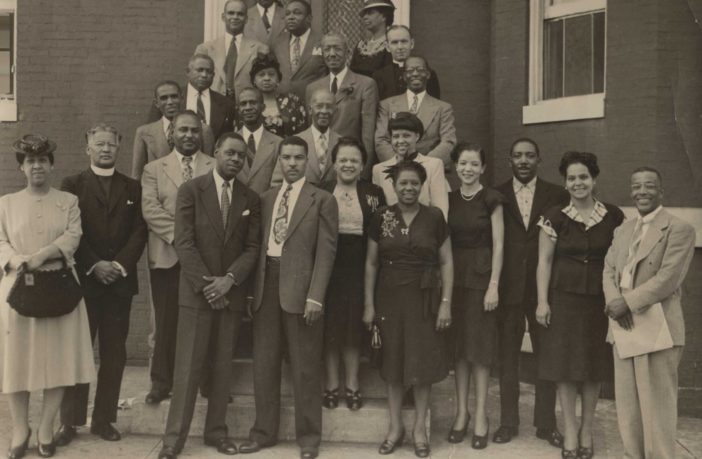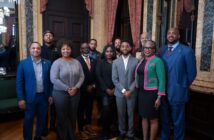By Deyane Moses,
Special to the AFRO
This article was inspired by Afro Charities’ recent acquisition of historic doors that indicate the NAACP and AFRO shared offices in Baltimore. Read more about the doors here.
In the heart of a segregated Baltimore during the tumultuous 1920s, a powerful partnership blossomed between two iconic institutions—the AFRO-American Newspapers and the NAACP-Baltimore City Branch.
The extent of the AFRO’s support for the Baltimore NAACP remains a forgotten chapter in history. Now, the recent purchase of historic doors has uncovered a remarkable past in which both organizations became intertwined, united by a shared goal: justice, equality and uplifting African Americans in Baltimore.
Members of the NAACP – Baltimore City Branch’s steering committee for the membership campaign photographed in 1947. Left to right, front row: Florence Snowden, the Rev. C.E. Mills, Dr. Bernard Harris, Walter W. Cook, Kenneth Bass, Alice B. Arrington, Mamie Tilghman, campaign director Marian Bond, William Y. Clarke, Juanita J. Mitchell and committee chairman Carl Murphy. Second row: the Rev. A.J. Payne, the Rev. Octavius Graham, Marion Pollett and Vera Scott. Third row: the Rev. E.L. Lofton, Vivian G. Alleyne, the Rev. John T. Colbert, Father Philip Kirrane and William Kindle. Top row: Newly appointed Executive Secretary Clarence Parham, the Rev. Joshua Williams, William Taylor and Baltimore NAACP president Lillie M. Jackson. (Photo courtesy of AFRO Archives)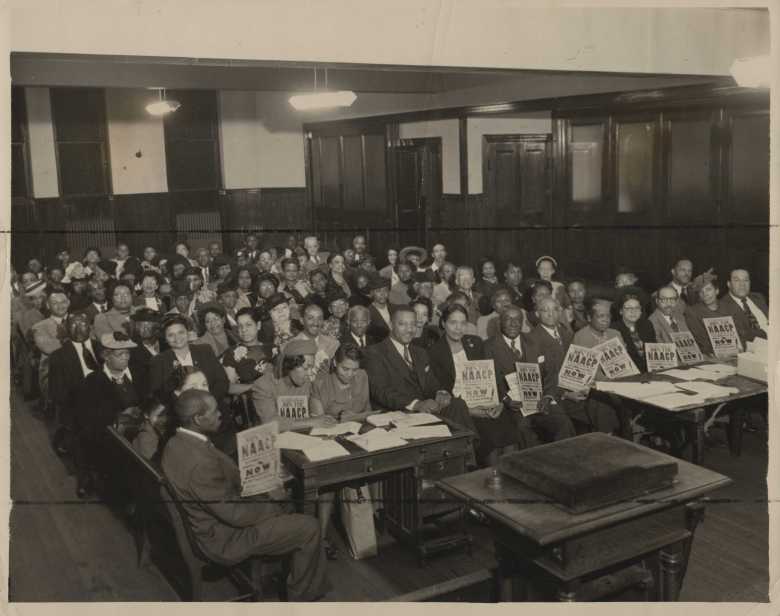 Members and supporters of the Baltimore NAACP gather for a membership campaign in 1948. (Photo courtesy of AFRO Archives)
Members and supporters of the Baltimore NAACP gather for a membership campaign in 1948. (Photo courtesy of AFRO Archives)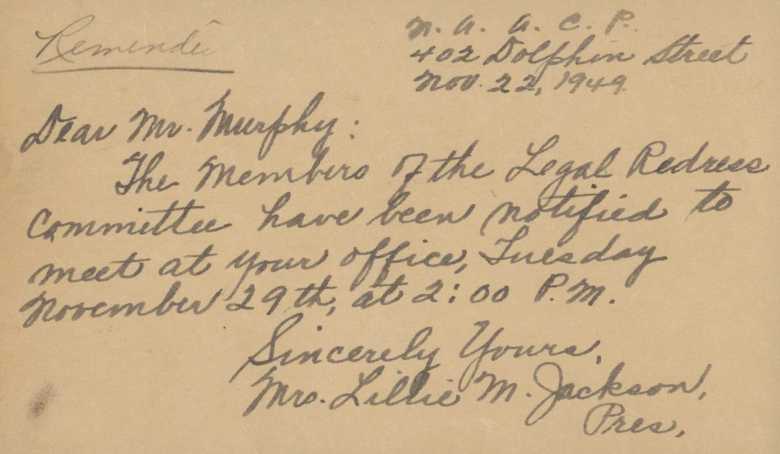 Baltimore City Branch President Lille M. C. Jackson sent a note to Carl Murphy concerning a meeting of the local NAACP’s Legal Redress Committee Murphy’s office in November 1949. (Image courtesy of AFRO Archives)
Baltimore City Branch President Lille M. C. Jackson sent a note to Carl Murphy concerning a meeting of the local NAACP’s Legal Redress Committee Murphy’s office in November 1949. (Image courtesy of AFRO Archives)
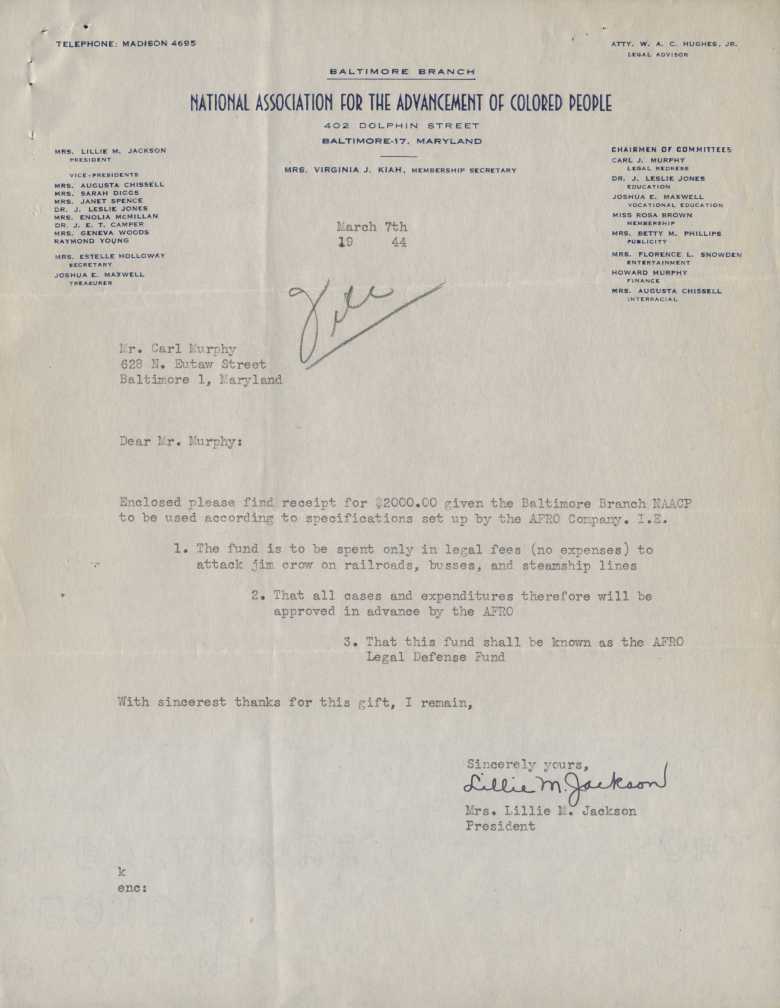 In the letter seen here, then-Baltimore NAACP President Lillie Jackson acknowledges receipt of $2,000 from Carl Murphy to establish the AFRO Legal Defense Fund in March of 1944. (Image courtesy of AFRO Archives)
In the letter seen here, then-Baltimore NAACP President Lillie Jackson acknowledges receipt of $2,000 from Carl Murphy to establish the AFRO Legal Defense Fund in March of 1944. (Image courtesy of AFRO Archives)
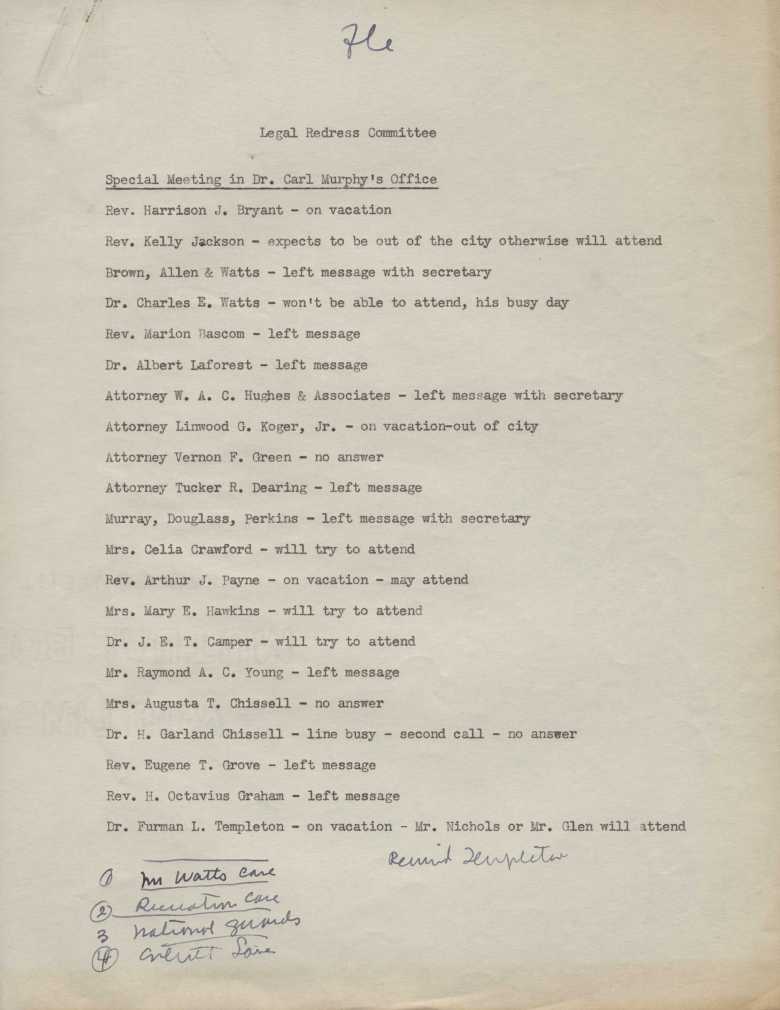 A list of the members of the Baltimore NAACP’s Legal Redress Committee for a meeting held in the AFRO’s office. (Image courtesy of AFRO Archives)
A list of the members of the Baltimore NAACP’s Legal Redress Committee for a meeting held in the AFRO’s office. (Image courtesy of AFRO Archives)
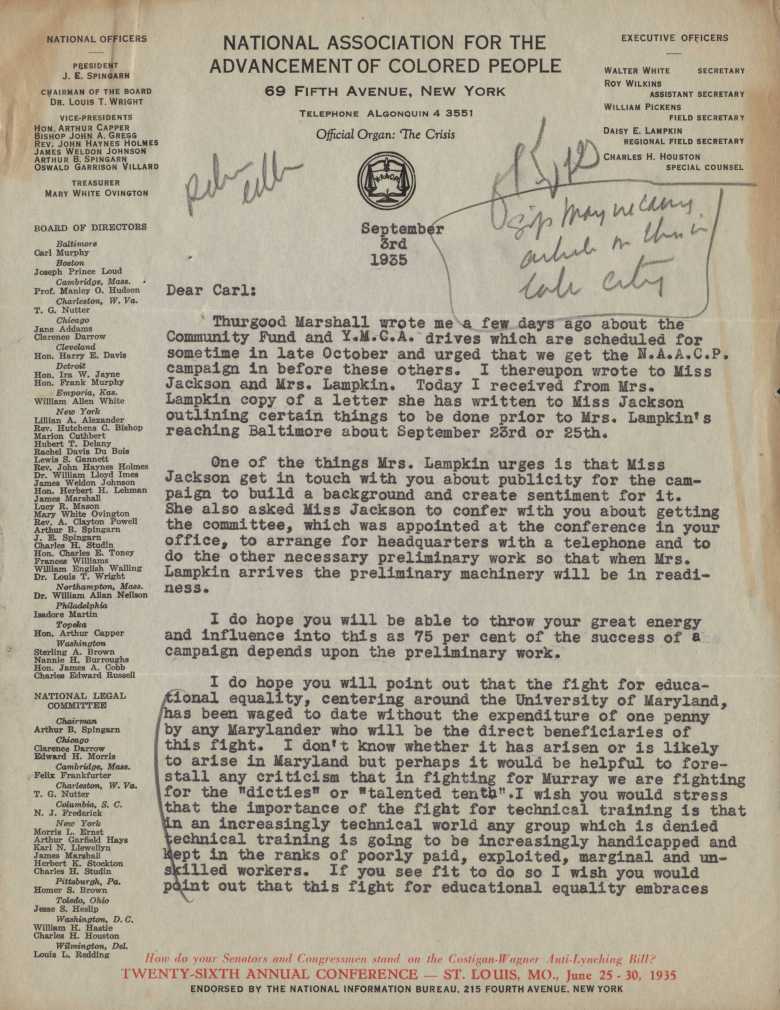 In this letter pictured here, Walter White, the then-secretary of the national branch, wrote to AFRO publisher Carl Murphy, asking for his assistance in setting up an office for the Baltimore NAACP Branch. (Image courtesy of AFRO Archives)
In this letter pictured here, Walter White, the then-secretary of the national branch, wrote to AFRO publisher Carl Murphy, asking for his assistance in setting up an office for the Baltimore NAACP Branch. (Image courtesy of AFRO Archives) 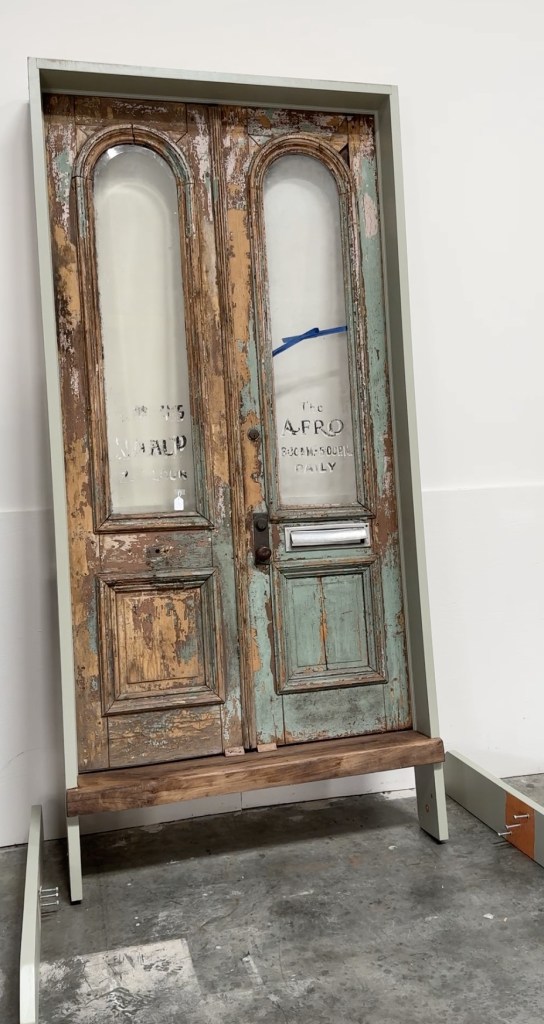 Historic doors recently acquired by Afro Charities indicate the AFRO’s shared past with the Baltimore NAACP. Not only did the two organizations share an office at one point, but also a shared mission of uplifting the African-American community. (Image courtesy of AFRO Archives)
Historic doors recently acquired by Afro Charities indicate the AFRO’s shared past with the Baltimore NAACP. Not only did the two organizations share an office at one point, but also a shared mission of uplifting the African-American community. (Image courtesy of AFRO Archives)
The doors, weathered by time, bear the marks of their historic significance. On the left glass pane, scantily legible through fading paint, the words “OFFICES, NAACP, 2ND FLOOR,” while the right side declares, “The AFRO, 8:30 AM-5:00 PM, DAILY.”
These doors, finally home and now protected, mark the threshold where esteemed lawyers like Thurgood Marshall and activists like Augusta Chissell convened to share ideas, create change, and consult with AFRO publisher Carl J. Murphy.
Born in Baltimore on Jan. 17, 1889, Carl Murphy has deep roots in the AFRO. The paper was founded by his parents, John H. Murphy Sr. and Martha Howard Murphy. Carl’s educational pursuits took him from Frederick Douglass High School to Howard University, where he earned a bachelor’s degree in German with honors in 1911.
However, Carl’s scholarly journey didn’t stop there. In 1913, he completed his master’s degree at Harvard University, then furthered his studies at Jena University in Germany. When he returned to Howard University in the fall of 1913, it was not only as an alumnus but as an assistant professor of German. His academic career was on the rise, but the family newspaper required his assistance. In 1918, Carl Murphy left the university just after he was appointed head of the German department.
The passing of John H. Murphy Sr. marked a turning point in Carl Murphy’s life. Elected by his family, he took up the mantle as publisher of the AFRO, a position he would hold until 1961 when he became chairman of the board. Under his visionary leadership, the AFRO-American Newspaper gained national prominence, with editions published in Baltimore, Washington, Richmond, Philadelphia and Newark. The newspaper’s readership soared into the hundreds of thousands, employing over 200 individuals and attracting renowned writers, artists, scholars, politicians and organizations. However, Carl Murphy’s impact extends beyond journalism.
While Carl Murphy was getting his footing as publisher of the newspaper, the city of Baltimore was deeply entrenched in racism and oppression. The NAACP’s Baltimore branch had its own set of challenges during the 1920s. Limited financial resources and uncertain leadership threatened its very existence. The AFRO reported the chapter’s financial struggles in 1929, causing Carl Murphy to send a heartfelt letter and a check to Walter White, the then-secretary of the national branch, making the AFRO a lifetime member.
“Dear Walter, Believing that it’s never too late to do good, the AFRO-AMERICAN desires to obtain a life membership. Enclosed is a check for $100.00, as an annual contribution.”
In 1930, Linwood Koger, the then-president of the Baltimore branch, resigned amidst intense community and executive committee criticism. Koger believed the branch required a capable and assertive individual to lead it effectively. Recognizing the potential of Baltimore to become one of the strongest branches and Carl Murphy’s leadership, Robert W. Bagnall, the director of branches, approached him to assume the role of president.
Although initially reluctant to take on a formal leadership role, Murphy’s dedication to the cause was unwavering. He declined the position of president but played a pivotal role in facilitating the appointments of the Rev. A.C. Clark (1930-1933) and Lillie May Carroll Jackson (1933-1970) as presidents of the Baltimore NAACP. After Jackson assumed office in 1933, Walter White reached out to Murphy, requesting his aid in organizing a headquarters equipped with telephones and other necessary preparations. White emphasized that the success of the NAACP’s Baltimore branch relied heavily on these preliminary arrangements.
Carl Murphy went on to serve on the budget, administrative and executive committees of the Baltimore NAACP. Under his and Jackson’s influence, the branch’s membership swelled from under 200 in 1935 to over 25,000 by 1946. Murphy’s AFRO office even served as the planning headquarters for the 1936 NAACP Convention, drawing praise from Roy Wilkens for its pivotal role in the event’s success. More than 27,000 articles about the NAACP were published in the AFRO during Murphy’s tenure as publisher, providing a critical platform for the organization’s ideas and actions. On one occasion Walter White wrote to Carl Murphy, “Nowhere has there been such publicity as has appeared in the columns of the Afro during the past few weeks. You can’t begin to think how much this means to us here.”
Murphy’s involvement extended to the Legal Redress Committee of the Baltimore City Branch, where he served as chairman from 1935 until his passing in 1967, playing a key role in selecting legal cases and raising funds for court battles. The committee met, at minimum, once a month in the AFRO’s office at 628 N. Eutaw St. Their efforts led to the desegregation of facilities, workplaces and schools like the University of Maryland Law School in 1935. The case was a precursor to the landmark Supreme Court case Brown v. Board of Education in 1954. Thurgood Marshall himself acknowledged Murphy’s instrumental role in changing policy in the state.
Carl Murphy’s commitment wasn’t just words – he put his money behind his principles. In 1943, with an initial investment of $2,000, he established the AFRO Legal Defense Fund, initially intended for fighting Jim Crow laws on transportation (i.e. buses, railroads and steamships). Over time, the fund also supported the Baltimore NAACP’s general expenses, reflecting Murphy’s deep commitment to the organization’s success.
Carl J. Murphy’s influence in Baltimore cannot be overstated. He was a man whose influence transcended the pages of the AFRO-American Newspaper and resonated deeply in the history of the Baltimore NAACP. The historic doors that mark the intersection of these two institutions serve as a reminder of the unwavering dedication of leaders like Carl Murphy and Lillie Mae Carroll Jackson, whose vision and perseverance helped change the course of history. Afro Charities’ acquisition of the doors serves as a poignant reminder of the enduring legacy of those who fought for justice, equality and the betterment of African Americans in Baltimore and beyond.
Deyane Moses is curator of archives for Afro Charities.
Help us Continue to tell OUR Story and join the AFRO family as a member –subscribers are now members! Join here!
